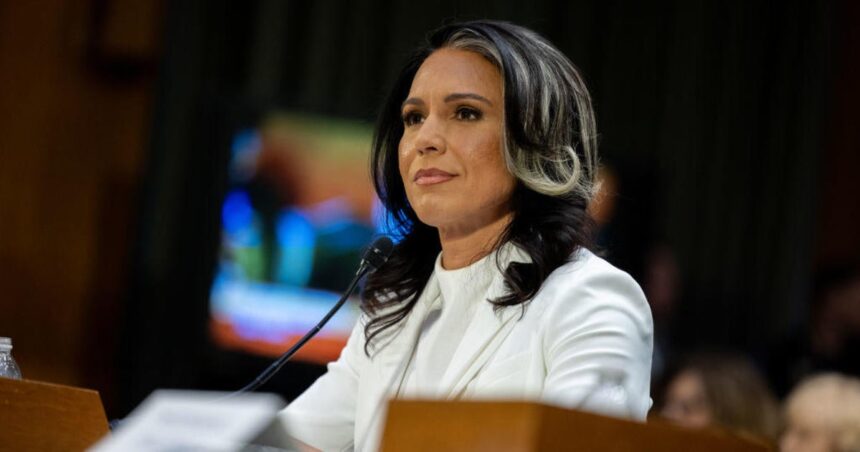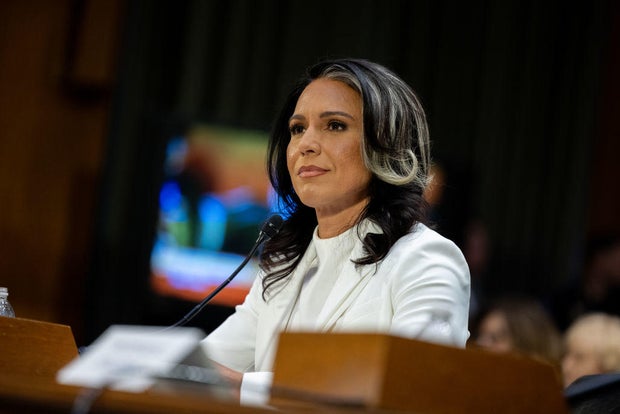Washington — Tulsi Gabbard survived a vital Senate Intelligence Committee vote on Tuesday after her nomination to be President Trump’s director of nationwide intelligence seemed to be in jeopardy.
In a 9-8 vote, the Senate Intelligence Committee superior Gabbard’s nomination to the total Senate. The vote fell alongside celebration strains.
Republicans on the panel who have been seen as potential “no” votes started to drop their objections Monday, with Sen. Susan Collins of Maine saying that Gabbard had addressed her issues and shared her imaginative and prescient of downsizing the Workplace of the Director of Nationwide Intelligence. Sen. Todd Younger of Indiana introduced Tuesday he would again Gabbard after he secured “commitments that may advance our nationwide safety.”
Nathan Posner/Anadolu through Getty Pictures
Mr. Trump’s selection to guide the intelligence group was seen as probably the most weak nominees heading into her affirmation listening to on Jan. 30, when she was grilled on quite a lot of controversial positions she has taken through the years. She confronted skepticism from senators over her determination to fulfill with Syrian dictator Bashar al-Assad in 2017, her previous push to pardon Nationwide Safety Company whistleblower Edward Snowden, her feedback about Russia’s conflict in Ukraine and her previous opposition to renewing a key authorities surveillance authority, often known as Part 702 of the Overseas Intelligence Surveillance Act.
Essentially the most contentious moments of the listening to got here as she was repeatedly pressed by Republican and Democratic senators on whether or not she would characterize Snowden as a “traitor.”
Gabbard declined to instantly reply the query, responding every time that “Edward Snowden broke the regulation.” She by no means stated that he was a “traitor” and at one level appeared to defend his actions, telling the panel that he had uncovered “egregious unlawful and unconstitutional packages” that led to reforms. Through the 2020 presidential marketing campaign, Gabbard vowed to pardon Snowden, who leaked a trove of knowledge on the U.S. authorities’s top-secret mass surveillance packages. Snowden fled to Hong Kong and later Russia, the place he lives in exile, after the leak.
“I don’t agree with or help the entire info and intelligence that he launched, nor the best way through which he did it,” Gabbard informed senators.
Gabbard additionally sought to alleviate issues about her criticisms of FISA Part 702, which permits the U.S. to gather international communications with no warrant. U.S. officers say it is essential to defending nationwide safety as a result of it helps disrupt terrorist assaults, cyberattacks and espionage actions. It doesn’t enable U.S. residents to be focused, however their communications could be swept up when they’re in touch with a focused foreigner.
Gabbard informed senators throughout her affirmation listening to final week it was “important” to nationwide safety, years after she tried to repeal the controversial regulation.
“There are a selection of areas that we’d be blind from a nationwide safety perspective with out this functionality,” she stated. “It additionally should exist subsequent to having safeguards in place to make sure Individuals’ civil liberties are protected.”
The previous congresswoman from Hawaii has additionally confronted criticism for her feedback in regards to the conflict in Ukraine and assembly with Assad, then doubting that his regime used chemical weapons towards civilians.
At her listening to, Gabbard conceded that Russian President Vladimir Putin “began the conflict in Ukraine” and that her skepticism of the chemical weapons assault was primarily based on “conflicting info and proof” that she was given on the time.
contributed to this report.







